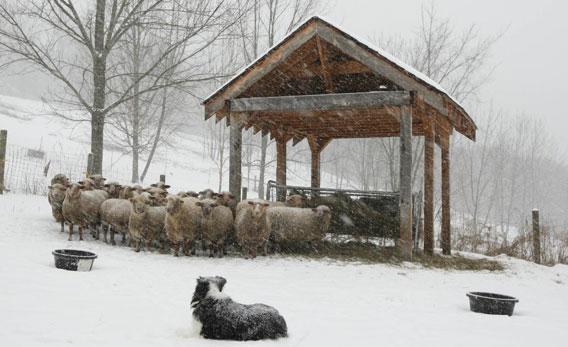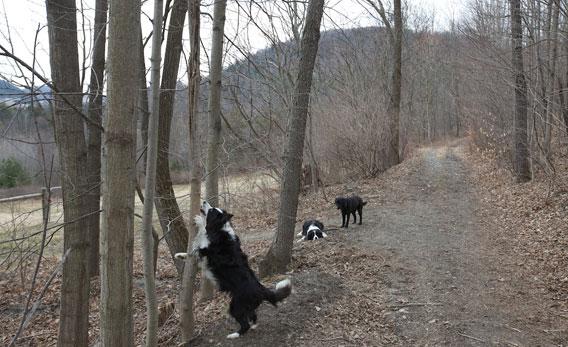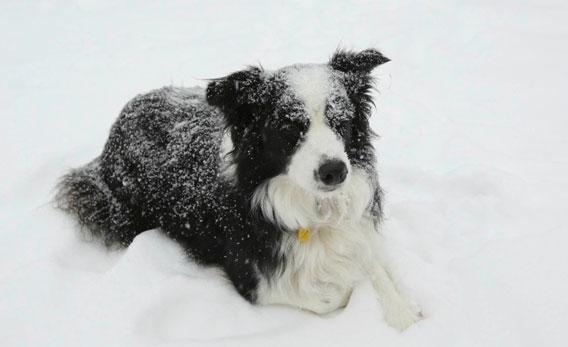Jon Katz has been writing about his farm, his livestock, and his dogs for Slate for nearly 10 years—especially about his beloved border collie, Rose. This month he publishes an e-book about her: The Story of Rose: A Man and His Dog. Here’s an excerpt.
I came to Bedlam Farm with my sheep in October 2003, days ahead of a relentless winter. I wanted to breed the sheep, have lambs, perhaps sell some of the wool to weavers, send some of the sheep to market. I didn’t simply want to be a gentleman farmer. I wanted the farm to be a real place where real animals lived real lives.
A friend helped me track down a sheep farmer in Massachusetts who had a breeding ram to sell for $200. Good papers, health certificate from the vet, and the father of some proud and beautiful offspring.
The ram came in November. He was unloaded from a small, rickety trailer, and Rose escorted him right into the pasture. He tried to butt her once or twice and then gave up and ran.
The sheep farmers reminded me that the lambs would be born in February, if all went well, and that I would need to be prepared with lambing pens, heat lamps, and hay. To be candid, it is close to insane to lamb in February in upstate New York. I would not do it again.
I had done my homework and had arranged for all of those things, but still, I was not even remotely prepared for the brutality of the winter or the challenges of lambing. That winter was one of the worst on record. One storm after another, finger-numbing subzero cold, and snow on the ground until April. The farmers told me that was what winter used to be like, but it was not like any winter I had ever seen in my previous lives in Massachusetts, New York City, Texas, or New Jersey.
I had my medical supplies, syringes, medications, tail dockers, vitamins, supplements, lamb’s milk, iodine, pens, lamps, straw, hay, heated water buckets. I had towels and extra flashlights.
The first wave of lambs came three weeks early, in the middle of the night and in the middle of a blinding snowstorm. I had believed I had plenty of time to get the ewes we thought were pregnant into the lambing pens I had built in the barn.
I remember sleeping in bed upstairs in the farmhouse and being awoken suddenly by a cold dog nose against my arm. Rose had hopped up into bed and was whining. She only did that when something was wrong. I had learned the hard way not to question this but to get up and follow her.
I looked out the window at the snow, piled up in drifts and still coming down hard, and muttered to myself. I got dressed quickly—I believe I was very much afraid of what I would find out there—and followed Rose downstairs. I put on my boots and heavy parka. Rose led me in the deepening slow and blustery cold winds to the pasture gate. We walked through the gate, into the barn, and out the other side, toward where the sheep were riding out the storm under the roof of my pole barn, a three-sided structure that the animals used for shade from the sun and shelter from snow and rain.
Once we got to the pole barn, Rose moved straight out into the snow, up the hill, and away from the barn, vanishing into the snowy mist. I turned on the huge light at the rear of the barn, switched on my foot-long flashlight, and then moved out into the storm, an awe-inspiring blend of heavy wind, drifting snow, and bitter cold.

Photograph by Jon Katz.
I wondered why Rose was not moving to the pole barn. After a second, over the howling noise of the wind, I heard an ewe baaing a high-pitched call of alarm and stumbled toward the sound. Ten or 15 yards to the side of the pole barn, the lights illuminated a beautiful, if haunting scene.
A ewe was lying on her side, clearly in labor. Snow was crusted over her wool coat and was beginning to drift over her frame. I saw Rose looking away from her at a little mound moving under the snow.
At first I thought this curious shape might be a raccoon or stray dog or fox, or some other animal struggling through the snow. As I got closer, I saw it was a newborn lamb, still glistening with fluid, shivering in the snow and cold.
I was frozen for a brief moment by the awful beauty of the scene. Rose moved quickly to head off the lamb, who was going uphill.
I knew—she also did, clearly—that a newborn lamb out in a storm meant almost certain death. I had heard stories of farmers finding lambs frozen to the ground.
I also knew that if she were separated from her mother for too long, the ewe would reject her and refuse to give her milk. The lamb would either die or have to be bottle-fed, a difficult and laborious process.
The lamb stood braying at Rose, perhaps thinking she was her mother. Rose seemed to understand that this creature was frail. She did not bark, charge, or nip at her.
Rose stood her ground gently in front of the lamb. She held the lamb in position until I could scramble up the hill, get my arms around the little creature, and then start to make my way back to the barn.
Rose did not need any commands. She stayed behind with the ewe, who was still lying on her side, struggling. The mother seemed ill to me, as if she might be dying. It could be anything—the birth, the cold, internal bleeding. The sheep farmers would often talk about “SSSD”—Sick Sheep Suddenly Die, and it was often true. A ewe would be sick in the morning and dead at noon. The vets never really knew why.
I got the bleating lamb—hungry and calling out for its stricken mother—into the barn, into one of the straw-lined stalls, and put the heat lamp on. I wiped the lamb off with a towel, gave her a vitamin shot, cut the umbilical cord, treated her with iodine, rubbed her roughly to get her circulation going, and squirted a thick vial of lamb’s milk into her mouth. She stood, shook herself off, and cried out for her mother.
Out in the storm, I heard the ewe’s weakening and pitiful replies. In the animal world, the strongest instincts are always those involving mothering. As Rose would learn, even the most docile sheep would turn into a lion if she thought her babies were being threatened. So if the ewe had been well, she would have been up and frantically searching for her offspring.
When I had the lamb as settled as I could, I went out and back up the hill. The storm was in full fury. My fingers and toes were already numb and aching, my glasses instantly frosted over with ice and snow, and I could barely see five feet in front of me. I had to take my glasses off to see at all. I found Rose and the ewe right where I had left them. The ewe was still on her side, breathing but silent, and Rose was standing right over her, looking down.
Rose had an inch or two of snow across her head and back. I had not seen Rose like this—close, intense, still. She seemed to know what she could do and what she could not do. And right then there was nothing she could do. She seemed protective of the ewe. She did not look around or try to leave. Rose seemed to have the sense that this was her responsibility.
I tried to pull the ewe up to her feet but could not; she just kept flopping over. Her eyes were open, warm breath coming out of her nostrils, her stomach rising up and down ever so slightly. I kept poking her and talking to her. “Get her up, Rosie,” I pleaded. “Get her up.” I thought of the sheep up in the pole barn, agitated by our presence and the cries of the ewe; the wind whistling across the pasture, and the snow piling up. Rose changed her demeanor, and when she heard the command and the tone of my voice, she began nipping at the ewe, first around her nose, then to the rear.
The ewe was at first silent, then seemed to emerge from a trance. Rose charged, then backed off, and charged and backed off again. The sounds from the ewe were stronger, and Rose seemed to quicken her pace, circling the ewe, the snow blowing off her coat as she raced back and forth. Get her up, Rosie, get her up. It was just the two of us, up in the pasture, far from the world, working together in this powerful way. Don’t give up, Rosie, don’t give up.
Then suddenly the ewe was on her feet, bleating and searching frantically for her baby and butting Rose. The ewe began to head out into the storm looking for the lamb, and Rose knew to cut her off, to get the ewe between her and me. She either slipped on the slick hillside or collapsed, falling on her side into the deepening snow. I struggled to get the ewe up, sliding in the mud and ice and snow, my toes and fingers burning in protest against the wet and cold.
I realized that I knew how to get the ewe into the barn. I stumbled back into the barn, grabbed a sling, slipped it under the lamb, picked her up, and brought her out into the storm. Keep her there, Rosie, keep her there.
And she did. I knew she would. When we got close, the lamb began crying out, and the ewe recognized her voice, then her smell. Frantic, she forgot about Rose and began moving toward me, toward her baby. I saw her bond with her baby and was shown again what a powerful instinct mothering is. I started moving backward toward the barn, sliding and falling but holding the lamb out in that sling. The ewe, uncertain, began following me, and when she panicked and tried to bolt, Rose got behind her and nipped at her to turn her back toward me.
The four of us—me, Rose, the ewe, and her lamb—were in this strange and ancient ballet, down the steep hill, back and forth, sometimes in circles, sometimes in a straight line, until the lamb and I made it into the barn. There the ewe balked, refusing to come in, and ran right over Rosie and began to climb up the hill to the pole barn, her safe place.
Rose turned into a wolf right there, barking and circling. She seemed larger to me, so determined, and then the ewe turned and ran toward me, deciding a man and a barn were much safer. I backed into the pen with the lamb and the ewe followed, and then I closed the gate and the two were safe and warm inside.
I rushed into the barn shed and got a jar of molasses and mixed it with water—energy for the exhausted ewe. There was no sweeter, deeper feeling than seeing that mother and child in their pen, dry and warm in a storm. We did it, Rosie, we did it.
And then I saw Rosie turn her head toward the barn door. She ran to it, and then I saw her swivel and tense, her ears up, fully alert. Something was wrong, something had happened, and I heard the cry that she had just heard, piercing and sharp.
Another lamb. There was another lamb up there. She had twins, I thought; she must have had twins, and both of them had been searching for her in the storm as she lay on her side.
Rose was already gone, back up the hill. I ran through the snow to find her, and at first I couldn’t, but then, about 20 yards from where we had found the ewe, she was sitting over a small figure covered in snow. Ice was forming on her head.
Like a ship out at sea in a sudden fog, the farmhouse and its lights had vanished in the snow, as if all of the life in the world had been blown away.
I set down the light and picked up the lamb. It was just us.

Photograph by Jon Katz.
I held the lamb in my lap, and it was then that I realized that this one was gone.
I was surprised, shaken, and numb, feeling so many things out there in that snowy pasture. Rose and I sat quietly over the dead body, this lamb that was our responsibility. Just a few minutes ago I had been asleep in bed. It was hard to get my bearings in that field, on that night.
Rose, too, I think, was uncharacteristically thrown off balance. She was not so sure about the world now. She had never seen a dead sheep before, never seen something in her charge die, nor had I. It was an awful feeling, not so much of grief, but of failure and sadness. I should have known, should have been better prepared, should have avoided this.
That night, on that hill, Rose and I did not yet know much about farms, about animals, about the nature of life. Rose, who kept a census of all things on the farm, was utterly professional and dispassionate about it that night. But it was not the same after that. Our world had changed.
I left Rose alone to sit up on the hill with the lamb for as long as she wished. Even then, I had this instinct to let Rose work things out, to see her amazing ability to process things and move forward, something I have struggled almost all of my life to learn how to do.
I came down to the barn to make sure my first lamb was healthy, which thankfully it was. A little later, I went to the rear of the barn, surprised that Rose had not come down yet to check on things.
The barn floodlight was on, and I turned the flashlight on the dark hill. There was Rose lying down next to the dead lamb, and looking down at the barn, at me.
Excerpted from The Story of Rose by Jon Katz. Copyright 2012 by Jon Katz. Excerpted by permission of Ballantine Books, a division of Random House, Inc. All rights reserved. No part of this excerpt may be reproduced or reprinted without permission in writing from the publisher.
